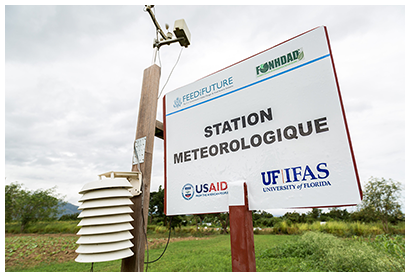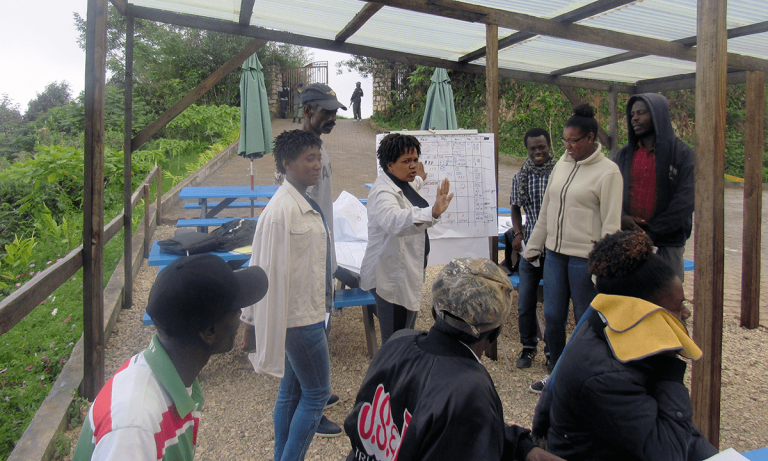AREA Climate Program Training Materials
AREA's Climate Smart Solutions team has developed and hosted workshops on a range of topics. These include teaching leaders of Haiti farmers' groups to help Haiti farmers adapt to climate change, using computer tools to analyze and present weather and climate data, and how to install and maintain weather stations. Learn more and download resources.
Weather stations
 One of AREA's early projects has been to orchestrate the installation of low-cost wireless weather stations at agricultural research centers (CRDDs) to provide researchers, agronomists and others with reliable meteorological data.
One of AREA's early projects has been to orchestrate the installation of low-cost wireless weather stations at agricultural research centers (CRDDs) to provide researchers, agronomists and others with reliable meteorological data.
Weather stations can play an important role in the productivity of the agricultural sector by providing data that is important to anyone planning, planting, harvesting and managing crops: temperature, rainfall, dew point and wind speed. Yet Haiti has few functioning meteorological stations.
- Phase 1: In mid-2017, AREA installed four solar-powered meteorological stations in rural areas outside of Port-au-Prince, and one on the campus of Haiti's state agricultural college (known by its French acronym FAMV). The stations provide data vital for use by the farming sector: temperature, rainfall, dew point and wind speed. (The FAMV station is not yet functioning.) To view the data, follow the links at the top right of this page.) The information is automatically updated every hour. As with all AREA projects, an essential component has been training Haitians — agricultural researchers, educators and other professionals — in all aspects of the development of low-cost, reliable weather stations. This includes siting, designing, parts purchasing, assembling, programming, installing and troubleshooting. Watch a video of William Eisenstadt, a professor of electrical engineering at the University of Florida and an AREA research team member, assembling a solar-powered weather station.
- Phase 2: Eisenstadt is overseeing improvements to the stations. He leads a group of UF electrical engineering students who are enhancing the stations with more features, including improved wireless internet connectivity, data storage, Bluetooth and smartphone functionality. The improvements will allow the downloading of raw data for use in agricultural research, extension and education in Haiti.
Research
To best help farmers, providers of advisory services need an intimate familiarity of local management and climate-related risks, as well as the sociocultural factors that impact farmers' decision-making. Since early 2018, AREA has conducted focus group discussions with more than 100 farmers to identify obstacles that limit the use of weather and climate information in agriculture. These include a lack of access to data and technology, and limited ability to use the information to make decisions. The results of this study will be shared and inform outreach programs focusing on climate-risk management in agriculture.
Capacity-building
- For producers of climate information
Haiti’s Ministry of Agriculture’s National Meteorological Services (UHM) has limited capacity for processing and communicating climate risk. In August 2018, AREA began training three UHM technicians how to conduct quality control of historical weather data and prepare graphics that extension agents can use to discuss climate risk with farmers. The trainees replicated what they learned in a workshop for professional technicians. In the spring of 2019, they partnered with AREA to deliver climate information to farmers ahead of the growing season.
- For users of climate information

Farmers around the world need to adopt disaster resilient farming practices to grow adequate amounts of food for growing populations and to generate income to meet household needs. In December 2018, AREA researchers launched Haiti's first Participatory Integrated Climate Services (PICSA) training program, an outreach approach designed to help farmers make better decisions in the light of increasing climate-related risks.
AREA trained 18 farmer leaders to use PICSA and then to roll out a training program to teach what they learned to farmers who are members of their associations. Since then, these leaders have used this approach to train more than 300 farmers in Haiti’s Kenscoff region ahead of the 2019 growing season. To share forecasts and updates with each other, the participants and UHM created a group on WhatsApp.
In a follow-up planning and review session, the trainers and members of UHM met with AREA staff to discuss the results of the roll out. Surveyed farmer leaders reported as a result of the PICSA program they were “closer to growers,” “better able to serve the community” and “more knowledgeable about the link between climate and agriculture.” Trainers commented that the roll out was “changing mindsets,” “improving planning” and “increasing their capacity to make informed decisions.” Importantly, the trainers said farmers acquired knowledge on how to control their investments by making strategic decisions to limit losses and increase yields in the face of seasonal changes in weather patterns. AREA will continue to evaluate the value of the PICSA training to improve its usefulness.
Data rescue
Haiti’s climate data infrastructure was severely compromised by the devastating earthquake that struck Haiti in 2010. AREA is working closely UHM to recover historical climate data, conduct data quality control and enter the information in a database.
Read more
Haiti Weather
AREA-installed meteorological stations provide continuously updated data on temperature, rainfall, dew point and wind speeds at various locations in Haiti:
• American University of the Caribbean (AUC), Les Cayes
• ANAPAAAH Farm, Croix-des-Bouquets
• Bas Boën CRDD, near Ganthier
• Kenscoff CRDD at Wynne Farm
• Montrouis, near Saint-Marc



 One of AREA's early projects has been to orchestrate the installation of low-cost wireless weather stations at agricultural research centers (CRDDs) to provide researchers, agronomists and others with reliable meteorological data.
One of AREA's early projects has been to orchestrate the installation of low-cost wireless weather stations at agricultural research centers (CRDDs) to provide researchers, agronomists and others with reliable meteorological data. 

